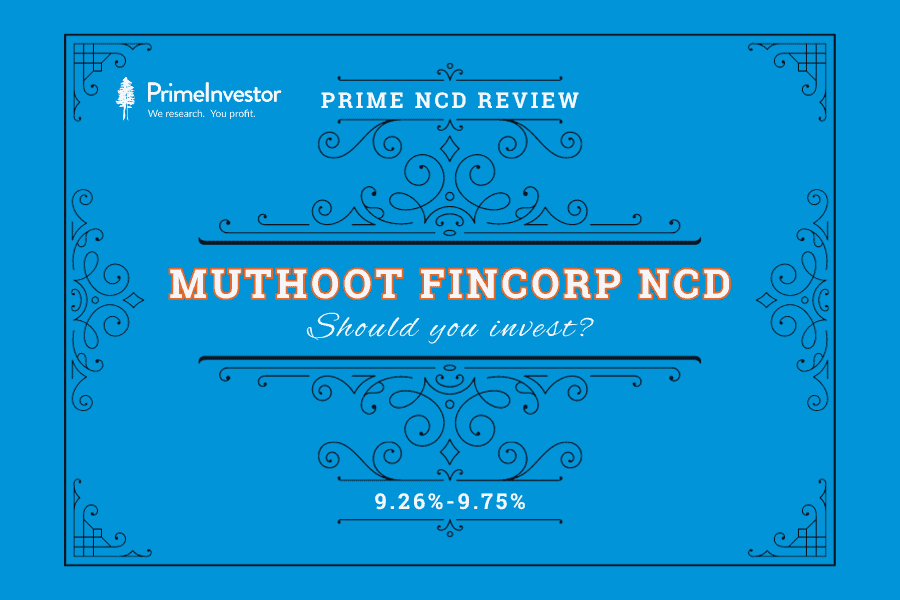Muthoot Fincorp, a non-deposit taking NBFC, registered with RBI, has come up with a public offering of secured non-convertible debentures (NCDs) for an amount aggregating to Rs.75 crore with an option to retain over-subscription up to Rs.225 crore, aggregating to Rs.300 crore
The minimum subscription should be for 10 NCDs and multiples of 1 NCD, which means a minimum investment of Rs.10,000 and in multiples of Rs.1,000 thereafter. The NCDs are proposed to be listed on the BSE and the tradable lot is 1 NCD.

The issue opens on January 12 and closes on January 25, 2024.
We are recommending the bond for investors with high risk appetite only (see Suitability section) and for select tenure. The rationale is given further down.
Rates and terms
Investors have ten options to choose from in this bond offer. There are four tenures – 2 years, 3 years, 5 years, and 8 years and monthly and annual interest pay-out options under 2, 3 and 5 year tenures. A cumulative option is available under all the four tenures. The accompanying table provides details of coupon rates on the regular options and effective yield on the cumulative options. Our preferred option – 36 months and annual payout is highlighted in yellow.
Note: Since the yields on cumulative options are not attractive, we are not giving them in the table nor are we recommending it.
Business Pros & Cons
Muthoot Fincorp (called in the market as Blue Muthoot) is part of the “Muthoot Pappachan Group” which has diversified business interests ranging from hospitality, financial services, inflight catering, infrastructure for information technology, automobile sales and services and real estate. Muthoot Fincorp is one of the three largest NBFCs engaged primarily in the gold loans business in India. It operates a network of 3619 branches across 24 states, although South India accounts for ~60% of the loan portfolio. At standalone level, gold loan accounted for ~93% of the loan portfolio while SME loans accounted for the rest at the end of September 2023.
The company has two other lending subsidiaries – Muthoot Microfin (50.21% post recent IPO) and Muthoot Housing Finance (80.66%) engaged in the business of microfinance (MFI) and affordable housing loans (AHFC), respectively. While these subsidiaries contributed to 43% of the consolidated book with microfinance forming the dominant share at ~33% at the end of FY23, this will change now as Muthoot Microfin has been separately listed and parent’s stake has significantly come down to 50.21% post IPO. This means that parent (Muthoot Fincorp) will be freed up from the capital requirement of a material subsidiary (Muthoot Microfin) - a significant positive development for the bond investors in Muthoot Fincorp.
At the end of September 2023, the gold loan AUM was at Rs.20,010 crore with total gold holding of ~48 tonnes as collateral. This business has been built over decades and has exhibited healthy growth combined with consistent asset quality.
Between FY18 and FY23, the business has gone through both ups and downs, first the uptick due to pandemic induced demand and a downtrend later due to fall in gold prices and asset quality issues on loans given during pandemic, resulting in record auctions.
This led to muted growth in FY23, and the woes got augmented by the competitive intensity from banks and new NBFC entrants. This was an industry wide phenomenon and not specific to Muthoot Fincorp. Now, the industry is shaping up for the better, with competitive intensity stabilizing or rather declining a bit, customers coming back to system and rising gold prices giving headroom for growth.
Below is a brief data on standalone financials of the company.
In the table above, you will see a spike in NPA in H1FY24. The spike in NPA was on account of ECL based provisioning in H1FY24 (which is nothing but expected credit loss and not actual). However, healthy loan to value (LTV) of ~70% in this business provides assurance regarding recovery. In the business of gold loan, recovery is almost always ensured given that the asset backing is gold. Hence this elevated NPA in H1FY23 need not be looked at as a major concern at present.
At the end of September 2023, Tier 1 Capital Adequacy Ratio (CAR) for Muthoot Fincorp, on a standalone basis, was 15.61%, a tad above the regulator prescribed Tier 1 capital of 15% and the total CAR was at 19.88%. This is lowest among the peers and that pushes the gearing up to 6.16 times (On Tier 1 CAR) at the end of FY23.
We think the company may be well positioned to raise funds through an IPO if needed, for 2 reasons: one, promoters own 79.69% stake in the company (plus other family members together own 100%) giving room for offloading. Two, given that the top two gold loan companies current have 1.5 to 2.5X price to book in the market, Muthoot Fincorp is well position to raised money from market through an IPO.
Credit rating
CRISIL Ratings has assigned a ‘CRISIL AA-/Stable’ rating to this NCD. It is noteworthy that this is an upgrade from the A+ stable rating afforded in 2021.
For arriving at the ratings, CRISIL Ratings has combined the business and financial risk profiles of Muthoot Fincorp (issuer of NCD), Muthoot Microfin (Subsidiary), Muthoot Housing Finance (Subsidiary) and Muthoot Capital Services (Group Company, listed). This is because all the companies, collectively referred to as the MPG (Muthoot Pappachan Group), have significant financial, managerial, and operational linkages according to CRISIL.
Furthermore, Muthoot Fincorp has exposure to real estate assets (that locks capital) which stood at Rs 450 crore (2.2% of total assets at the end of FY23) though it has come down from Rs.540 crores at the end of FY22 and Rs.876 crore in FY17.
Among other major factors considered for rating, CRISIL has highlighted the moderate capitalisation levels of the company that pushes up its gearing. CRISIL has arrived at a net gearing of 4.2 times at the end of FY23 after considering real estate investments and capital infusion by Private Equity, Greater Pacific Capital, in the form of CCCPS (otherwise gearing stood at 6 times on Tier 1 capital as mentioned earlier)
However, the rating agency also notes that capitalisation is supported by low asset-side risks (security of gold jewellery, which is liquid and in the lender’s possession).
Our take
Muthoot Fincorp is among the three largest gold financing company in India. It’s gold loan business has a long-standing track record and has high liquidity (gold jewellery as a security being liquid) thus mitigating the risks that can typically be associated with instruments with a AA- rating. The recent IPO of its subsidiary, Muthoot Microfin, is an added positive as it will free up the parent from the capital requirement for this material subsidiary.
The 9.5% coupon rate offered by the Muthoot Fincorp NCDs for a tenure of 36 months appears attractive relative to yields prevailing in the market. Currently, 3-year AA-rated bonds (including AA+,AA, and AA-) have spreads of 1.37% per cent while Muthoot Fincorp’s 36-month NCDs (annual option) translate into spreads of 2.42%. This spread is attractive on a risk-adjusted basis, considering the retail options available in the bond market today.
Suitability
Please note that this NCD is only for those with high-risk appetite. The risk stems from moderate levels of capitalisation (Tier 1 CAR of 15.61%) and the risk in the subsidiary business of micro finance.
This NCD scores higher on the risk front compared with our recently recommended Muthoot Finance NCD (Red Muthoot).
Muthoot Finance offered a yield of 9% and can be chosen by those with moderate risk appetite as it fares significantly better on credit rating (2 notches above this), business parameters (No.1 player), capital adequacy (30% Tier 1) and governance (also being listed).
Investments in NCDs for income purposes must be considered after exhausting safe government-guaranteed options.
The NCDs being offered are proposed to be fully secured by way of subservient charge with existing secured creditors on all loan receivables (both present and future) of the company. The bonds do not carry any Put or Call options. They will however be listed on the exchange where investors can exit before maturity. However, such exit is subject to adequate trading volumes and the market price can vary from face value.
Taxation
Interest income on NCDs is taxable at your slab rate whether on pay out or under the cumulative option (if you hold till maturity). If you sell the bond in the exchanges in less than a year, short-term capital gains, at your tax slab, will be applicable. If you sell after a year of holding, then long-term capital gains tax of 10% without indexation will apply.




2 thoughts on “Prime NCD review – Should you invest in Muthoot Fincorp NCD?”
Are you not giving the yields on cumulative options as we should not be tempted by the more attractive yields?
Unless the cumulative option yields better (and it does not), we did not want to give our recommendation on it. thanks, Vidya
Comments are closed.